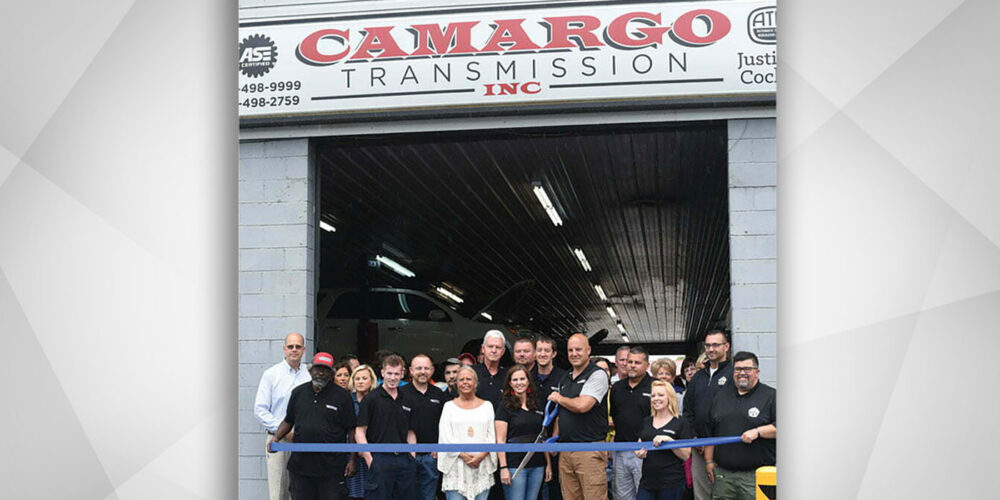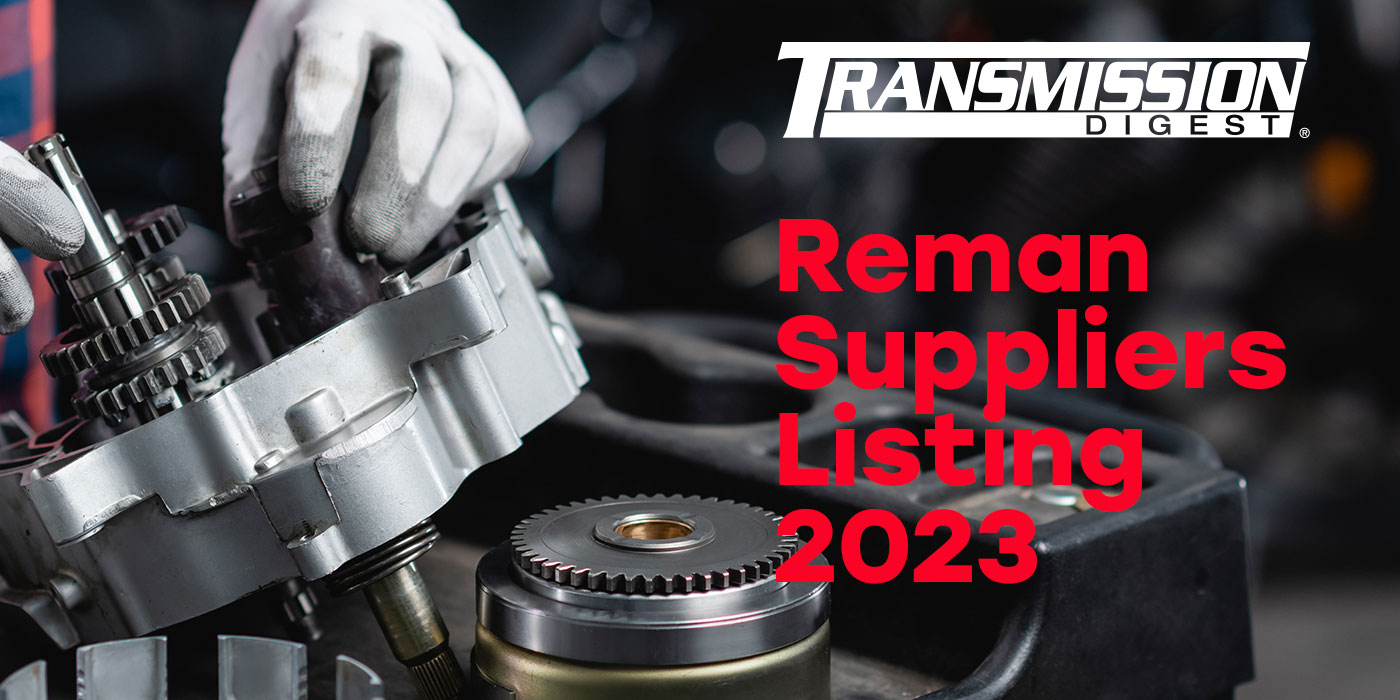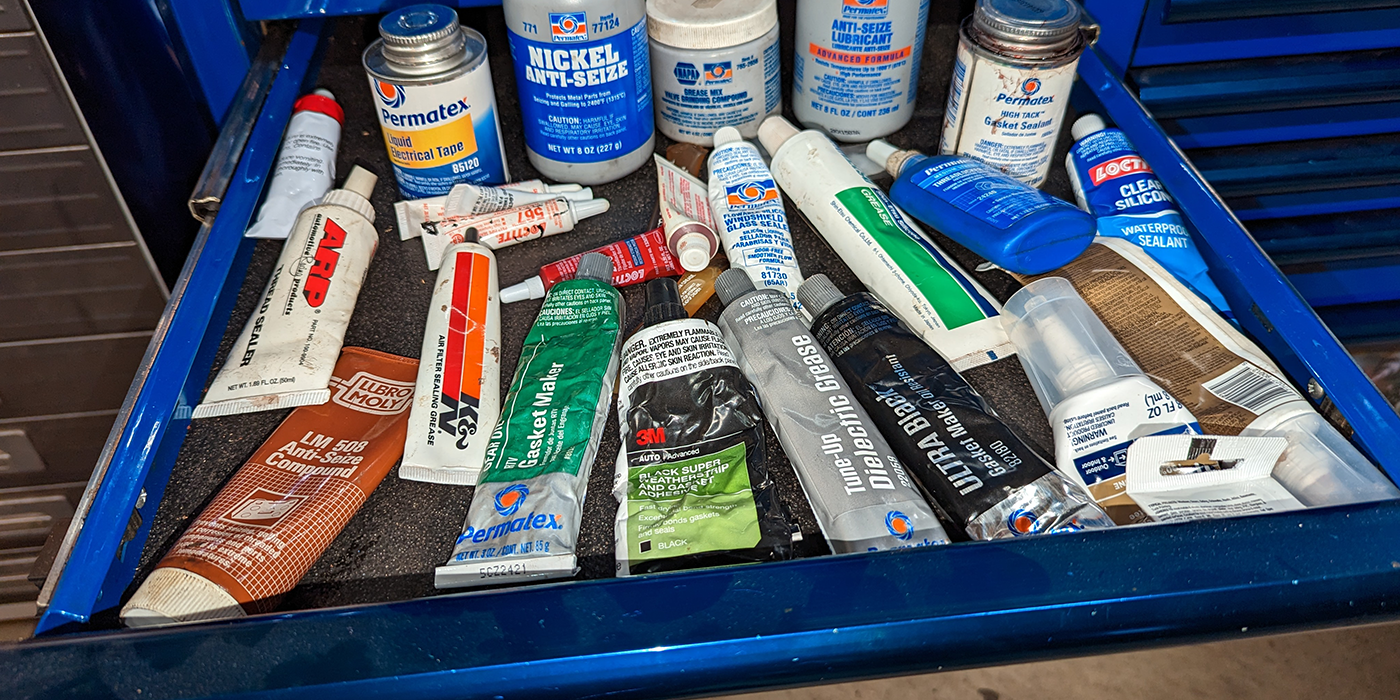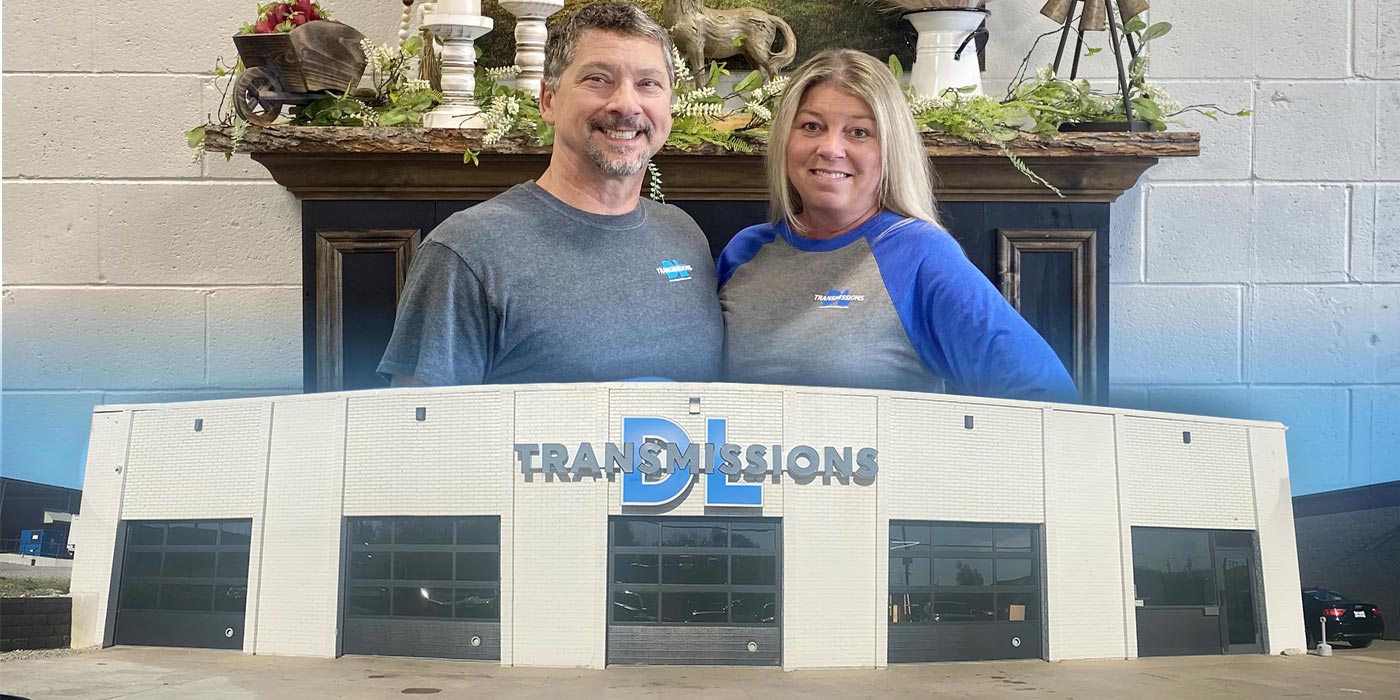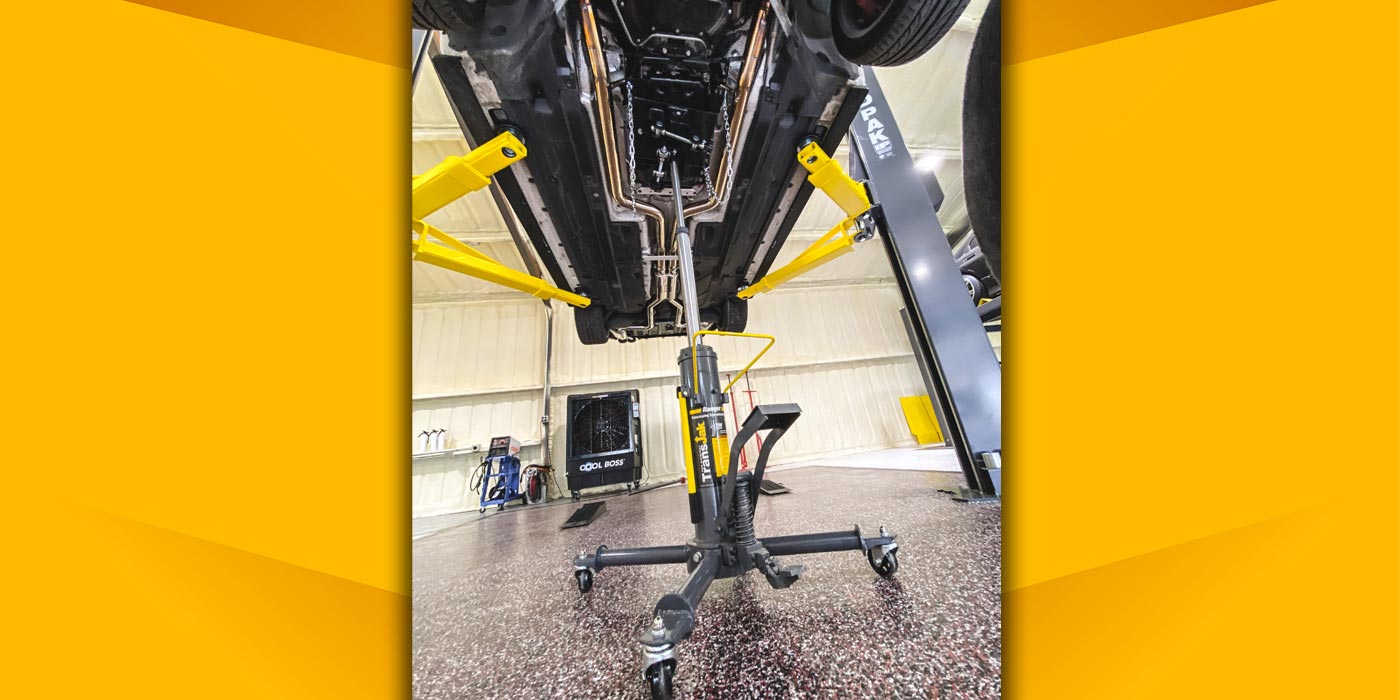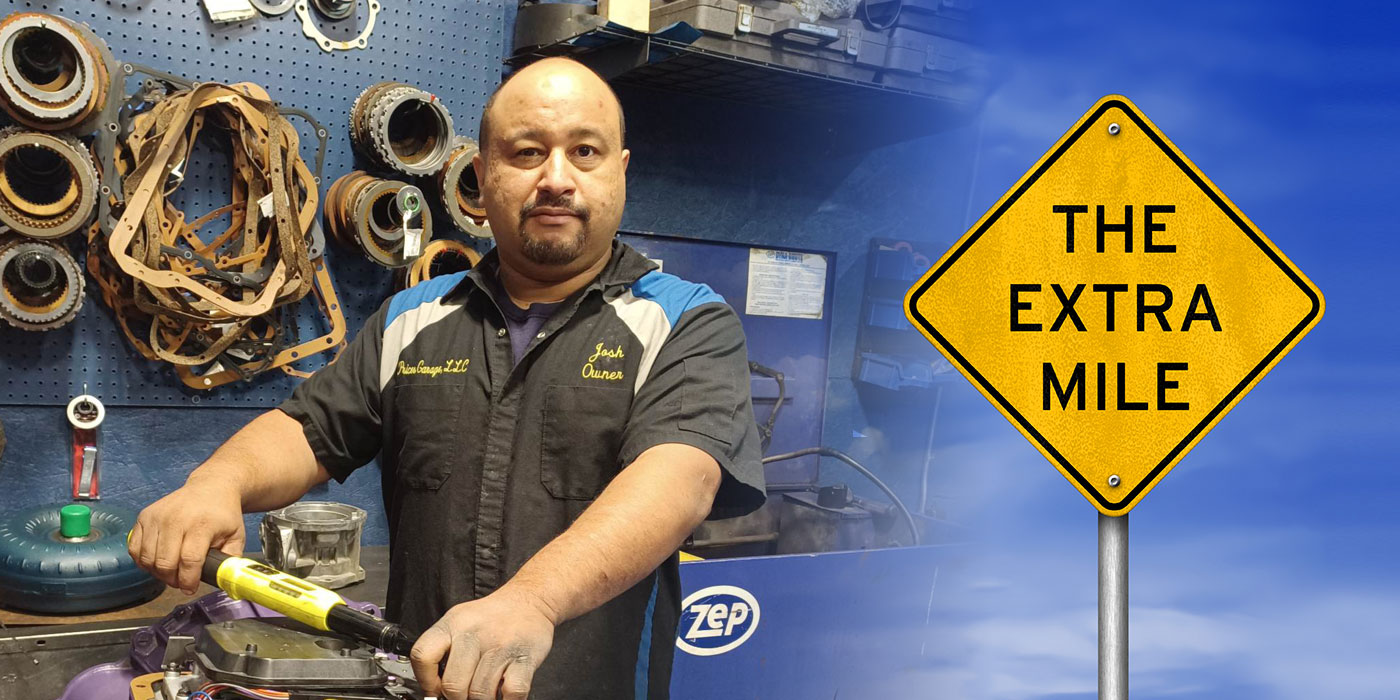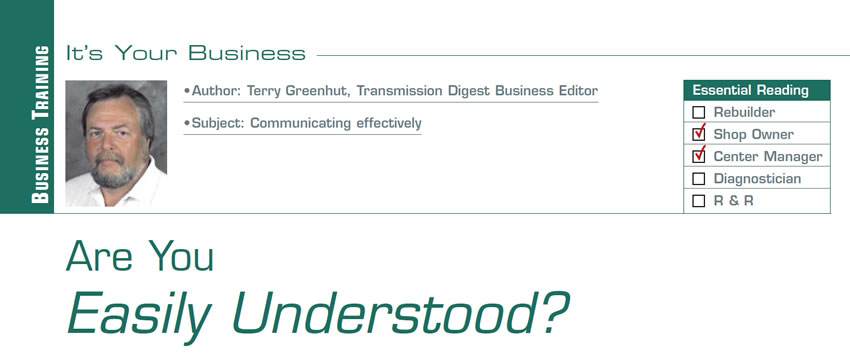
It’s Your Business
- Author: Terry Greenhut, Transmission Digest Business Editor
- Subject: Communicating effectively
- Essential Reading: Shop Owner, Center Manager
When in the process of selling a job to a customer or giving an instruction to an employee or supplier are you sure that they understand what you’re saying? If they look as if they do and then don’t go ahead and do what you expect, it can be for other reasons but mostly it’s because they didn’t really hear or understand, even if they said they did.
People are focused on what’s important to them at the moment. If what you’re saying either doesn’t have enough significance for them or they don’t fully understand it, you lose them. They can look you right in the eye and go “Uh-huh, uh-huh” and not be getting a word of it. When you use words that people can’t understand either because they are technical terms or they’re just above the grade level of education that the average person has, again you can lose them. If you try to use acronyms or abbreviations to shorten up your questions or statements, you need to know for sure that the other person knows what they mean or again you will lose them. In other words, it’s so easy to lose their attention and so hard to keep it. You can keep it, however, by simplifying your terminology and by showing them how what you’re saying benefits them. People always listen when they think they are going to derive a benefit from it.
It drives me nuts when I am reading about a computer product or service, for example, and just as I’m getting into learning something I really wanted to know they throw in some made-up word that looks like it’s from outer space. I focus on trying to figure out what it means and lose the entire gist of what I was learning. If I get frustrated because it was a critical point I usually click the left mouse button and bail out of the article completely.
So why turn customers off or make them think you’re trying to show how smart you are by using words they don’t understand when there is no need for it? Same thing goes for giving instructions to suppliers or employees. Use words they can comprehend. If you are in front of someone, always look into their eyes when you talk. I know you’ve heard that before in terms of how sincere it makes you look; however, in most instances you’ll be able to read when they aren’t getting it by that glazed-over look or by their turning away or looking up as if they are trying to get help to understand. Why don’t people just tell you when they don’t understand something you’ve said? Because they have pride and don’t want to look ignorant. They think maybe they were supposed to know what that word meant. Heck, the one who said it must know; why don’t they?
Before a technical term spills out of your mouth think about this: “Is there any reason on earth why the person I’m speaking with should know this term?” If you can’t be sure, either don’t use it or immediately explain it. Think about the words “torque converter.” If you weren’t in this business would you have any idea what that is? So when I hear a service writer tell a customer, “And you’re going to need a torque converter” and then stop without at least saying, “Do you know what that is?” I say to myself, “There’s a salesperson who just made it very hard to close the sale.” Remember that if you can’t explain a term you shouldn’t be using it, because you don’t understand it either.
The best way to make sure an employee or a supplier is listening and absorbing what you say is to get them to repeat it back to you. After you give an order, for example, just say, “Tell me what I just said.” If they can’t repeat it back (and it doesn’t have to be word for word) they either didn’t hear it, didn’t register it or didn’t understand it.

Speak loudly enough for others to hear you easily. The old trick of speaking so softly that you force people to come closer or listen more carefully isn’t really a good idea. All it does is make people angry, especially the ones who actually have a hearing problem, and a lot of folks who grew up during the loud-music era or worked in a shop or factory setting do.
Are you in too much of a hurry when you talk, or do you mumble? Either way you are losing your audience. Speak clearly and slowly enough that people can understand you but not so slowly that you put them to sleep. When speaking with someone one on one, try to match their speed. Fast talkers are usually fast thinkers, and slow talkers, conversely, tend to think a bit more slowly. If you speak slowly to a fast thinker you bore him. If you talk too fast to a slow thinker you lose him.
Here’s how you can tell if you are mumbling or speaking too low or too fast: when you keep hearing the other party say, “What?” If enough others keep making you repeat what you’re saying, the problem is not them; it’s you. Think about your purpose in talking to people. It’s to pass information along, it’s to convince, it’s to entertain, it’s to give an order. For any of those to have a successful conclusion the other person has to hear and understand every word you say.
Speak with enthusiasm but don’t overwhelm. If you are too enthusiastic you tend not to be believable. People are growing increasingly skeptical. They now look for reasons not to believe what they hear. The tone and volume of your voice indicate whether you are on the level. Very loud salespeople or those with a superior tone turn customers off. In selling we always talk about the importance of asking questions to get prospects to tell you what it will take to close the sale. Another great reason to ask questions rather than make statements is that they make you far more believable. They show your concern and make customers and employees feel as if you are truly in their corner.
If you have an employee who makes a mistake or really screws something up the best thing you can do is to keep away from that person until you are calm, because yelling is not communicating. All that happens when you yell is to put the other party on the defensive, at which point they roll up into a self-protective ball and shut out anything you say. Later on, have a conversation with him or her starting with your stating what happened. Never attack the person, only the problem. As angry as you might get don’t ever call anyone “stupid.” It’s the ultimate insult and will immediately shut down any further conversation. Ask what they think caused the problem. Once they’ve told you ask, “How do you think we can keep this from happening again?” If you give them the answer the problem may recur many times. If you ask and they offer the solution it will likely never happen again. Employees like solutions that they think up, not necessarily the ones their bosses give them.
Give positive reinforcement when an employee solves a problem or does something well. It makes them strive to do it again. Everyone likes to be recognized for doing their job well. Don’t be afraid to compliment employees for doing a good job. I know shop owners who never praise technicians for doing anything right for fear that they will ask for raises. It may happen once in a while, but mostly they just want to be acknowledged. That has more value to some people than money. One shop owner told me he doesn’t praise his people because he knows that five minutes after he does they’ll screw something up and make him sorry he ever said anything nice to them. How silly is that?
Finally, try reinforcing your customer’s buying decision right after they’ve agreed to your closing question by saying something like, “That’s a good choice” or “I know you’ll be happy with that.” And don’t forget to use the phrase “Thank you” a lot. Everyone understands that one.

Terry Greenhut, Business Editor. Visit www.TerryGreenhut.com.





